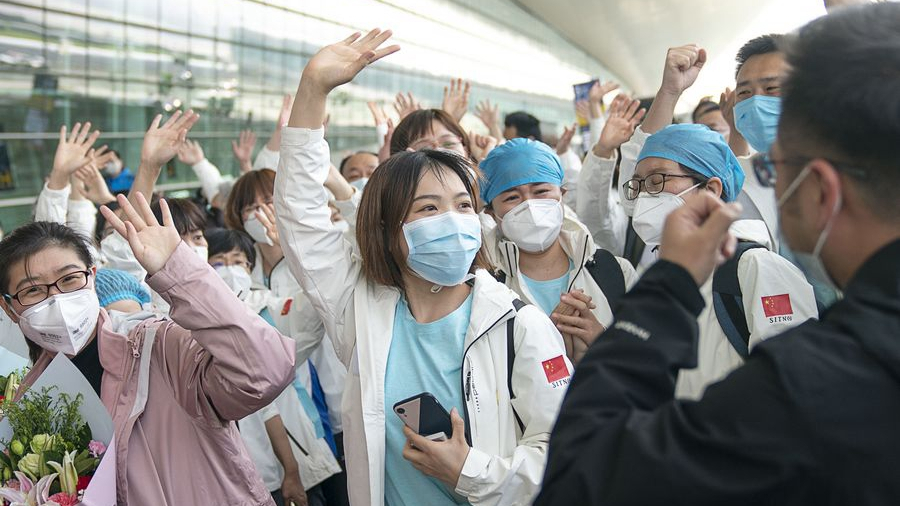
Editor's note: Stephen Ndegwa is a Nairobi-based communication consultant, and international affairs columnist. The article reflects the author's views, and not necessarily those of CGTN.
Tuesday, April 7, seems to have passed just like any other day. Ironically, it should have been marked as one of the most important days this year, as the world grapples with the ravages of the COVID-19 pandemic.
The annual World Health Day is celebrated on April 7 under the aegis of the World Health Organization (WHO). This year's theme is dubbed, "Support nurses and midwives," which aims at celebrating the critical role nurses and midwives play in the health sector globally.
Indeed, the acknowledgment of nurses in modern society could not have come at a more opportune moment. This is reflected in WHO comments, which note that, "Nurses and other health workers are at the forefront of COVID-19 response – providing high quality, respectful treatment and care, leading community dialogue to address fears and questions and, in some instances, collecting data for clinical studies. Quite simply, without nurses, there would be no response."
As of April 4, over 100 nurses and doctors worldwide had died while battling COVID-19, with these cases occurring mainly in the pandemic's hotspots of China, the United Kingdom, Spain, France and Iran. Currently, nurses, and other medics in the U.S., have warned that they are becoming increasingly overwhelmed due to the exponential rise in COVID-19 incidents of infection.
The chief executive officer of the International Council of Nurses, Howard Catton, was recently quoted in the U.S. magazine Newsweek stating that, "We have been concerned for some weeks now about how many nurses and other healthcare staff have become infected with the coronavirus. Nurses around the globe are working under extreme pressure for long hours without breaks and without days off, and it is taking its toll."
While many of the nurses are dying as a result of contracting the novel coronavirus in the course of duty due to inadequate personal protective equipment (PPEs), others have committed suicide due to COVID-19 related depression. They have not witnessed such massive desperation in their careers.
In Africa, nurses suffer double jeopardy. On one hand, there is the issue of low pay, which has forced thousands of nurses migrate, particularly to the U.S. and Europe, attracted by better remuneration for the same job. There are also better opportunities for them to advance their careers overseas.
Those who remain behind and continue working in local conditions, particularly in public hospitals, work without adequate PPEs, exposing them to their patients' deadly ailments. The COVID-19 crisis has exacerbated the prevailing hopelessness, with nurses bearing the brunt of inadequate PPEs and necessary treatment regimens, as global supply chains become constricted amid extremely high demand.
A 2015 research by the Joint Learning Initiative revealed that the average health worker density (nurses, midwives and physicians) in Africa was around 1:1,000, against the world average of 2.5 per 1,000 population, which is necessary for achieving adequate coverage of health services.

Medics from north China's Tianjin Municipality wave goodbye before their departure in Wuhan, central China's Hubei Province and the epicenter of the COVID-19 outbreak in China, March 17, 2020. /Xinhua Photo
Medics from north China's Tianjin Municipality wave goodbye before their departure in Wuhan, central China's Hubei Province and the epicenter of the COVID-19 outbreak in China, March 17, 2020. /Xinhua Photo
Sadly, the situation has remained largely the same. Due to budgetary constraints, the number of nurses graduating from nursing school in Africa is still insufficient to cater for rising health care needs of the growing population.
According to WHO statistics, the needs-based shortage of health care workers globally in 2013 was estimated at about 17.4 million, of which approximately nine million were nurses and midwives.
If this trend persists, there are real fears that there will not be enough nurses to take care of COVID-19 cases going forward. Worse, there is a likelihood that nurses in developing countries might migrate exponentially to more developed countries, from the lure of a better life for their struggles.
Still, the current predicament facing nurses from COVID-19 is universal, with the international nurses' union admitting that the growing rate of infection among these critical frontline caregivers is related to the global shortage of PPEs.
As a new phenomenon, the learning curve for the treatment and care of COVID-19 patients for most nurses is steep. Consequently, many of the previous diseases rampant in some regions risk being neglected. For instance, previous cries of the high number of cancer cases have gone silent, as the immediate need to take care of COVID-19 cases takes center stage.
According to "Activating Nursing to Address Unmet Needs in the 21st Century," a report published in March 2019 by the Robert Wood Johnson Foundation, the nursing profession could contribute significantly to addressing the global health sector crisis if it embraces its historic role of bridging medicine and society.
In addition, experts observe that educators, employers, and policymakers should engage nurses sufficiently in order to create roles that allow them to utilize their education and training effectively. Moreover, with inadequate hospital care, some countries will have to rely and invest more on community health workers to offer palliative care as a way of easing intense pressure on healthcare facilities.
Indeed, the role of midwives can also now be recognized, as maternity wards are turned into intensive care units for COVID-19 patients. Definitely, thousands of babies around the world are being delivered at home, which means that more resources will also have to be allocated to these trained health professionals to help pregnant women during pre-natal and post-natal care.
(If you want to contribute and have specific expertise, please contact us at opinions@cgtn.com.)